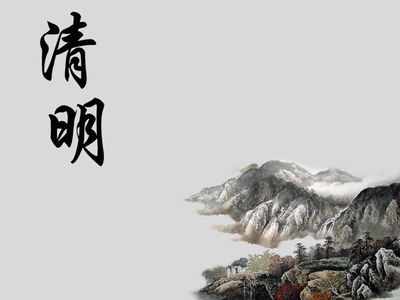Tomb-sweeping Day
春至清明,祭先祖,會(huì)舊友,憶故人,思己身。
Dialogue 1
Mark: Jingjing, are you all set to go on your trip?
馬克:京晶,你都準(zhǔn)備好開(kāi)始你的旅行了嗎?
Jingjing: That isn't until next week, after the holiday.
京晶:那是下周的事,節(jié)后了。
Mark: Oh yeah, we have a couple days off. Do you have to work on the weekend?
馬克:哦,是嗎?我們有幾天假,你周末還得工作嗎?
Jingjing: No, I have four days off in a row. I'm going to use it to get some work done early, and spend one of the days with friends or relatives here in Beijing.
京晶:不了,連下來(lái)我總共有四天假期。我要用它來(lái)提前完成一些工作,然后花一天時(shí)間和在北京的朋友、親戚們聚聚。
Mark: Do you have any ancestors here?
馬克:這里有你的先人嗎?
Jingjing: Well, a cousin of mine is married to a Beijing native. We might get asked to come along to honor their grandparents who have passed on. Most likely, we'll meet them after they've taken care of that, though.
京晶:我的一位表姐嫁給了北京當(dāng)?shù)厝耍麄兛赡軙?huì)叫上我們一起去給他家過(guò)世的祖父母祭奠。最可能的是,他們完事以后我們?cè)僖?jiàn)面。
Mark: Have you ever burned spirit money or joss paper on the street?
馬克:你曾經(jīng)在街上燒過(guò)紙錢(qián)嗎?
Jingjing: No, I haven't. I understand why people do that. But I try to get back to my home town at least once a year, so I can visit the actual resting place of my relatives.
京晶:沒(méi)有。我理解人們?yōu)楹文菢幼觥5俏冶M量每年回家鄉(xiāng)一次,這樣我就能去親自前去親人們的安息之地了。
Mark: Do you usually go there with your mom and dad?
馬克:你通常會(huì)跟著父母同去嗎?
Jingjing: Yes, we walk up the hill to the burial site together. If any other relatives are in town, they come too.
京晶:是的,我們一起爬上山去墓地。如果還有其他親戚也在,他們也會(huì)一起來(lái)。
Mark: That sounds like a good way to spend a morning together with members of your family.
馬克:聽(tīng)上去是一個(gè)不錯(cuò)的和家人一起共度上午的方式。
Jingjing: Yeah, I usually enjoy it, even though it's not fun per se. It takes me back to childhood: the smell of incense, carrying bags for the older people that are with me, all that stuff.
京晶:是的,我很喜歡。雖然這本身并非是相聚來(lái)玩的。但這總把我?guī)Щ赝辏合慊鸬臍馕叮嫱械拈L(zhǎng)輩們拎著包,諸如此類(lèi)。
Mark: The ceremony hasn't changed, I imagine.
馬克:祭奠的儀式一直以來(lái)都沒(méi)有改變過(guò)吧,我猜。
Jingjing: Not really. Let's talk about it more next time.
京晶:沒(méi)有。下次我們多聊幾句。
New words: 習(xí)語(yǔ)短語(yǔ)
all set 準(zhǔn)備好了
ready
ancestors 先人,先祖
relatives older than parents, no longer alive
passed on 過(guò)世的
no longer living
spirit money 紙錢(qián)
a kind of "play money" burned as an offering to the dead
joss paper 紙錢(qián)
paper made for burning, with a special smell
resting place 墓地
grave or other burial site
per se 本身 本質(zhì)上
exactly
takes me back to 令我想起…
makes me remember, makes me miss old times
incense 香
sticks made for burning, with a special smell

Dialogue 2
Mark: So, Jingjing, are you ready to have some days off?
馬克:那,京晶,準(zhǔn)備好休息幾天了嗎?
Jingjing: You bet! I like working, but I definitely like having some time to myself.
京晶:那是當(dāng)然!我喜歡工作,但是我當(dāng)然也喜歡留點(diǎn)時(shí)間給自己。
Mark: Is there anything special that you do on the Qingming weekend—if you don't go back to your home town?
馬克:清明這個(gè)周末你會(huì)做點(diǎn)什么特別的事嗎?如果不回老家的話
Jingjing: Well, it's a great time to reflect on life.
京晶:這可是很好的能用來(lái)反思生活的時(shí)間了。
Mark: Do you get together with anyone?
馬克:要和誰(shuí)聚一聚嗎?
Jingjing: If my relatives are in town, of course it's family time. If not, I see friends that have it like I do—away from family for work.
京晶:如果我的親戚們都在一個(gè)城市的話,這當(dāng)然是應(yīng)與家人相處的時(shí)間。如果不在的話,就去見(jiàn)見(jiàn)那些和我一樣為了工作離開(kāi)親人的朋友們。
Mark: It must be nice to catch up with people you haven't seen in a while.
馬克:見(jiàn)到許久不見(jiàn)的人那種感覺(jué)一定很棒。
Jingjing: It really is. I remember in past years, there were a few times I stayed in Beijing, didn't have relatives with me, and called around to see who wanted to meet for lunch.
京晶:確實(shí)。我記得過(guò)去幾年,有好幾次我在北京,身邊一個(gè)親人也沒(méi)有,我到處打電話找人出來(lái)吃午飯。
Mark: Do you have a regular group?
馬克:你有經(jīng)常能聚的朋友們嗎?
Jingjing: Usually, yes. But with the holiday, my closest friends are sometimes tied up.
京晶:通常有的。但是節(jié)假日到來(lái)時(shí),最親近的朋友有時(shí)也忙得不可開(kāi)交。
Mark: That's a good chance to see people you lost touch with.
馬克:那就是個(gè)好機(jī)會(huì)去見(jiàn)見(jiàn)失去聯(lián)系的人們。
Jingjing: Exactly. I try to gather four or five people, and sometimes end up having lunch with old friends who have two or three years' worth of stories for me.
京晶:的確。我盡量攢四五個(gè)人,有時(shí)候往往最后和那些兩三年沒(méi)見(jiàn)的朋友們相聚吃了飯。
Mark: It's a good time of year for it. Don't forget to send out those messages to see who's free.
馬克:這當(dāng)然是一年中適宜相見(jiàn)的時(shí)節(jié)了。別忘了發(fā)發(fā)信息看都誰(shuí)有空。
Jingjing: For sure.
京晶:一定的。
New words: 習(xí)語(yǔ)短語(yǔ)
reflect 省察,沉思
think about something you have done, consider what to do differently in the future
tied up 繁忙的
busy











